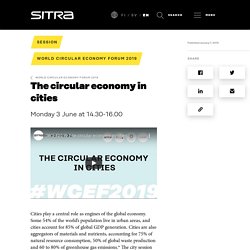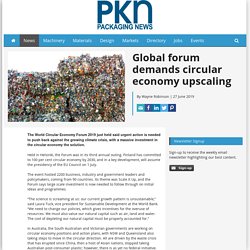

Below is a more detailed description of the topic:
Increasing pressure on the stock of natural resources with associated volatility of prices and concerns about reliable access have fostered a growing discussion on ways for a transition to a low-carbon circular economy. In response, the European Commission has developed a number of strategies and targets and will now continue this work in the context of the European Green Deal.
Even the transition to a circular economy already requires significant changes in the predominant take-make-consume-dispose model. But beyond that, there is discussion in academia, civil society and the political spheres as to whether these concepts and commitments are sufficient to keep us within planetary boundaries. Going beyond a circular economy to a regenerative or ecologically positive economy to further enhance the retention of value of resources in the economy suggests even more dramatic changes to the current approach while at the same time modifying the profile of environmental pressures (e.g. air, water or soil pollution) in the various phases of the life cycle of resources.
This could lead to alternative organisational and entrepreneurial structures aimed at maintaining and obtaining higher value from resource use, and providing societal benefits. These could be informal or community businesses, or take legal forms such as co-operatives, mutual, associations or foundations. They could mobilise social capital, empower users and consumers, provide access to goods and services, and create jobs. As the importance and prevalence of alternative economic and business models and structures increases, what might be the long-term environmental and social risks and opportunities?
Political. Environment. Social. Technological (and business) Legal. Economic (and business) Renewable Matter – international magazine on the bioeonomy and the circular economy. The circular economy in cities. Cities play a central role as engines of the global economy.

Some 54% of the world’s population live in urban areas, and cities account for 85% of global GDP generation. Cities are also aggregators of materials and nutrients, accounting for 75% of natural resource consumption, 50% of global waste production and 60 to 80% of greenhouse gas emissions.* The city session will discuss the role of cities in leading the change towards a circular economy and acting as platforms for innovation and business development in the circular economy.
*source: Moderators: Tiina Kähö, Smart & Clean Foundation and Siiri Mäkelä, The Finnish Agenda2030 Youth Group Organisers: Helsinki Metropolitan Smart & Clean Foundation, Climate KIC, Ellen MacArthur Foundation, EIB and Sitra. Cradle to Cradle Congress. Global forum demands circular economy upscaling - PKN Packaging News. Held in Helsinki, the Forum was in its third annual outing.

Finland has committed to 100 per cent circular economy by 2030, and in a key development, will assume the presidency of the EU Council on 1 July. The event hosted 2200 business, industry and government leaders and policymakers, coming from 90 countries. Its theme was Scale it Up, and the Forum says large scale investment is now needed to follow through on initial ideas and programmes. “The science is screaming at us: our current growth pattern is unsustainable,” said Laura Tuck, vice president for Sustainable Development at the World Bank. “We need to change our policies, which gives incentives for the overuse of resources. In Australia, the South Australian and Victorian governments are working on circular economy positions and action plans, with NSW and Queensland also taking steps to move in the circular direction.
The WCEF2019 said the solution to the climate crisis is the circular economy. Wcef2019summaryfinalfixed. Blog Archives - Wellbeing Economy Alliance. Top 100 Economics Blogs of 2019. How Circular is the Circular Economy? - Local Futures. Planet Local - Local Futures.
Worth scanning for interesting initiatives – owhite1
#circulareconomy hashtag.
To be reviewed at some point for recent (last 2 months?) posts - maybe good source – owhite1
The Netherlands-based Triodos Bank is fully circular.